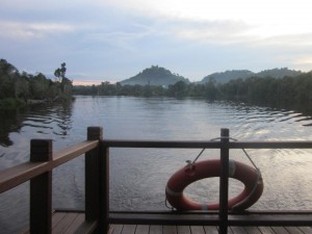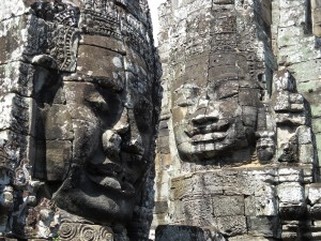
This is another installment of Cedar’s Digest, a series of poetic stories about the experiences my husband, Ren Ruslan Feldman, and I are having living for six months in Central Borneo. We are volunteer teachers in a small, innovative Indonesian school. The school is child-centered with a focus on hands-on learning and character development. Classes are taught in English and Indonesian.
we’re back on the river
in the boat
this time for an overnight
more orangutans
more little motorized river boats (klotok)
we stop at a remote village
still only reachable by boat
we are welcomed by a ceremony
Ren, as the elder among us
is invited to break the egg with his foot
he is symbolically breaking the barrier between us
then each of us is asked our name
and our purpose and where we are from
and receive some white paste on each cheek–
our passport to the village
teenage girls in matching yellow whirl
and smile demurely in their Dyak dance of welcome
one comes to get me to dance
and the others draw Ren in
the steps are easy to get
and impossible to keep
the midwife and the head men lead us
down the one street in town
past the mosque, the hindu temple,
and the church with one member
we easily engage with the villagers
especially, of course, the children
we stop and play hand games
and sing and dance and ask their names
and meet their pet cats
and collect rubber seeds like marbles
no electricity or running water
but generators and satellite dishes
provide a bit of light and black and white TV
virtually all the houses are plain, simple, and humble
people on the porches readily laugh and joke
we visit the school
fine buildings for a small town
return to bigger places on the weekend
Indonesia is a remarkably literate country
we are shown how to drain latex from a rubber tree
(cut slit in bark and hold tin can under the drip)
we see how coffee is roasted (2 1/2 hours over an open flame)
and ground in a wooden mortar and strained through a sieve
straight from the beans picked in the back yard
one meter from the house
we each have a cup
sitting in the front room of the midwife’s house
she has a painting of The Last Supper on the wall
and a guest book for us to sign
the coffee is strong and sugary
I sit on the floor with a gaggle of sweet little girls
I’m dripping with sweat and happy
on the boat with us are
two NASA scientists who are
studying the complex interactions of particles
in the atmosphere in twenty international locations
“The A-train of satellites crosses directly above us
every noon taking measurements gathering data
to help us understand climate change so we can
figure out how to mitigate it in whatever ways we still can.”
Jon, another passenger, is a 21 year old Dutchman
who is visiting remote villages trying to bring some
increased and dependable income to them.
His company has developed a machine that can
instantly make rubber seeds
(which haven’t been used for much of anything until now)
into bio fuel (a remarkable 60% of the seed is used).
The villagers collect the rubber seeds,
bring them to the truck that puts them through the machine.
The villagers instantly get paid back in whatever combination
they want of bio fuel and cash.
The truck then goes on to another village
and returns again periodically.
The idea is for the company to just break even
and as soon as possible pass the business on
to the villagers as a franchise.
food and conversation on the boat are rich and nourishing
the day cools down
the movement of the boat brings a breeze
and then the bats come out
big bats, streams of bats
suddenly it’s like going down the river
in Lord of the Rings….enchanting
stars are clear
no light pollution here
peace
I remember the Girl Scout song
“Peace I ask of thee oh river
peace, peace, peace
When I learn to live serenely
cares will cease.”
A tepid, sweaty night
turns into early morning
glorious on the prow of the boat
sweet coffee in hand
occasional excitement of orangutans
swinging in the trees
by the river’s edge
now passing river villages and
bone houses for the ancestors
back to our boat landing
we’re back on the river
in the boat
this time for an overnight
more orangutans
more little motorized river boats (klotok)
we stop at a remote village
still only reachable by boat
we are welcomed by a ceremony
Ren, as the elder among us
is invited to break the egg with his foot
he is symbolically breaking the barrier between us
then each of us is asked our name
and our purpose and where we are from
and receive some white paste on each cheek–
our passport to the village
teenage girls in matching yellow whirl
and smile demurely in their Dyak dance of welcome
one comes to get me to dance
and the others draw Ren in
the steps are easy to get
and impossible to keep
the midwife and the head men lead us
down the one street in town
past the mosque, the hindu temple,
and the church with one member
we easily engage with the villagers
especially, of course, the children
we stop and play hand games
and sing and dance and ask their names
and meet their pet cats
and collect rubber seeds like marbles
no electricity or running water
but generators and satellite dishes
provide a bit of light and black and white TV
virtually all the houses are plain, simple, and humble
people on the porches readily laugh and joke
we visit the school
fine buildings for a small town
return to bigger places on the weekend
Indonesia is a remarkably literate country
we are shown how to drain latex from a rubber tree
(cut slit in bark and hold tin can under the drip)
we see how coffee is roasted (2 1/2 hours over an open flame)
and ground in a wooden mortar and strained through a sieve
straight from the beans picked in the back yard
one meter from the house
we each have a cup
sitting in the front room of the midwife’s house
she has a painting of The Last Supper on the wall
and a guest book for us to sign
the coffee is strong and sugary
I sit on the floor with a gaggle of sweet little girls
I’m dripping with sweat and happy
on the boat with us are
two NASA scientists who are
studying the complex interactions of particles
in the atmosphere in twenty international locations
“The A-train of satellites crosses directly above us
every noon taking measurements gathering data
to help us understand climate change so we can
figure out how to mitigate it in whatever ways we still can.”
Jon, another passenger, is a 21 year old Dutchman
who is visiting remote villages trying to bring some
increased and dependable income to them.
His company has developed a machine that can
instantly make rubber seeds
(which haven’t been used for much of anything until now)
into bio fuel (a remarkable 60% of the seed is used).
The villagers collect the rubber seeds,
bring them to the truck that puts them through the machine.
The villagers instantly get paid back in whatever combination
they want of bio fuel and cash.
The truck then goes on to another village
and returns again periodically.
The idea is for the company to just break even
and as soon as possible pass the business on
to the villagers as a franchise.
food and conversation on the boat are rich and nourishing
the day cools down
the movement of the boat brings a breeze
and then the bats come out
big bats, streams of bats
suddenly it’s like going down the river
in Lord of the Rings….enchanting
stars are clear
no light pollution here
peace
I remember the Girl Scout song
“Peace I ask of thee oh river
peace, peace, peace
When I learn to live serenely
cares will cease.”
A tepid, sweaty night
turns into early morning
glorious on the prow of the boat
sweet coffee in hand
occasional excitement of orangutans
swinging in the trees
by the river’s edge
now passing river villages and
bone houses for the ancestors
back to our boat landing


 RSS Feed
RSS Feed